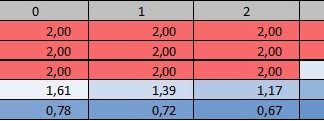Description
Harry is an inventory manager. He has several tasks. His main focus remains monitoring and reporting on his company’s stock levels.
He is responsible for developing stock tracking systems, reviewing supply levels, ordering new materials and conducting daily analysis.
- Design and implement a stock tracking system to optimise stock control procedures.
- Prepare detailed reports on inventory transactions, stock levels and adjustments.
- Plan deliveries with suppliers according to various criteria (type of packaging, quantity, frequency of truck rounds)
- Monitor supplier performance criteria (delivery times, quality levels, compliance with conditions negotiated by the company)
- Check the quality and quantity of goods received
- Negotiate alternative solutions with suppliers in case of malfunction, sometimes in a hurry
- Monitor sales and forecasts to ensure product availability and supervise the preparation of orders.
Job Posting
We are seeking a full-time, organized, and experienced Inventory Manager capable of effectively supervising and managing all aspects of our company’s inventory. The ideal candidate must possess excellent management skills, a strong ability to adapt, and a continual desire to learn. Solid organizational skills and meticulous attention to detail are essential.
Main Responsibilities:
- Supervise and maintain real-time stock inventory.
- Optimize stock management processes to ensure efficiency and minimize inventory costs.
- Proactively replenish stock to avoid any shortages.
- Maintain accurate inventory records in our management information system.
- Identify and report any damaged items or inventory discrepancies to ensure non-conformance records are kept.
- Collaborate with other departments to integrate logistics with the business processes of the company.
Required Qualifications:
- Proven experience in inventory management or a similar role.
- Proficiency in inventory management software and supply systems.
- Excellent ability to work under pressure and solve problems effectively.
- Strong interpersonal skills and the ability to work as part of a team.
SIPOC of a Inventory manager
Here is an example (rtf) of a Inventory manager SIPOC.
Job Description : Inventory Manager
In this role, you will be responsible for overseeing all aspects of the inventory management process, including purchasing, receiving, and storage of products
As an Inventory Manager, you will play a critical role in overseeing and optimizing the entire inventory management process for our company. This includes the procurement, receipt, storage, and management of products across various locations. You will ensure that inventory levels are managed efficiently to meet the ongoing needs of the business while minimizing cost and maximizing productivity.
Responsibilities:
- Develop and maintain an efficient inventory management system that ensures accurate and up-to-date records of all incoming and outgoing products.
- Collaborate with other departments, such as sales, purchasing, and logistics, to ensure inventory levels meet business requirements.
- Perform regular physical counts of inventory and compare results to system records to ensure accuracy.
- Develop and implement processes for inventory tracking and optimization, including Just-In-Time inventory management principles.
- Monitor inventory levels and demand trends, and make informed decisions about inventory levels to avoid stockouts or excess inventory.
- Negotiate with suppliers to ensure timely and accurate deliveries, and resolve any conflicts regarding inventory levels.
- Continuously evaluate and improve inventory management processes to increase efficiency and reduce waste.
- Provide regular reports on inventory performance and make recommendations for process improvements.
Requirements:
- Bachelor’s degree in supply chain management, business, or a related field.
- [Number of Years] of experience in inventory management, with experience in a fast-paced, multi-location environment a plus.
- Strong organizational and prioritization skills, with the ability to manage multiple projects and tasks simultaneously.
- Excellent communication and collaboration skills, with the ability to effectively communicate with internal and external stakeholders.
- Strong data analysis skills, with experience using inventory management software programs and databases.
- Familiarity with Just-In-Time inventory management principles and a passion for continuous process improvement.
Daily Problems
An inventory manager in an industrial company may encounter several daily problems such as:
- Inventory or stock shortage: Forecasting errors can lead to expensive overstock or a shortage of products to satisfy customer demand.
- High inventory management costs: The cost associated with inventory management can be high due to storage space, inventory management, and product rotation.
- Inefficient inventory management: Inefficient inventory management can lead to delays in delivery times and poor customer satisfaction.
- Product loss: Product loss can be caused by tracking errors or inappropriate storage conditions.
Data analysis can provide a solution to these problems by providing accurate information on inventory levels, demand trends, and associated costs. Data can be used to optimize inventory levels, improve demand forecasting accuracy, and minimize inventory management costs. In addition, data analysis can also help detect product losses and identify causes to avoid them in the future.
Utilizing Data Analysis
Data analysis is integral in addressing these challenges by offering precise insights into inventory levels, demand forecasts, and operational efficiencies. By leveraging data, the Inventory Manager can optimize stock levels, enhance the accuracy of demand forecasts, and reduce overall inventory management costs. Moreover, analytics serve as a critical tool in identifying and rectifying sources of product loss, ensuring sustainable business practices.
Challenges
Inventory management in industrial settings presents a complex array of challenges that can significantly impact the efficiency and profitability of operations. One of the primary issues is maintaining the delicate balance between overstocking and understocking. Overstocking ties up capital in unsold goods and increases storage costs, potentially leading to obsolete inventory as market demands shift. Conversely, understocking can halt production lines and lead to missed sales opportunities, damaging customer relationships due to delayed deliveries. Moreover, industries face the challenge of managing a vast array of items with varying shelf lives and handling requirements, complicating the task of inventory optimization.
Additionally, industries often struggle with the integration of accurate forecasting and demand planning techniques. Forecasting errors can stem from volatile market conditions, rapid technological changes, or unforeseen shifts in consumer preferences, all of which make demand planning highly speculative and prone to inaccuracies. These inaccuracies can lead to significant discrepancies between stock levels and actual market needs, resulting in either surplus or shortages.
The advent of globalization has also expanded the geographical spread of supply chains, increasing the complexity of logistics and inventory management. Coordinating across multiple time zones, dealing with varied regulatory requirements, and managing risks associated with international suppliers add layers of complexity to inventory management. Furthermore, technological integration, while beneficial, requires significant investment and poses its own challenges. Implementing sophisticated inventory management systems, such as RFID and IoT sensors, necessitates substantial upfront costs and ongoing maintenance. These systems also demand a high level of digital literacy and training among staff to ensure effective utilization.
Another critical challenge is maintaining quality control, especially for industries involving perishable goods, hazardous materials, or high-value items. The cost of inventory shrinkage—due to theft, damage, or spoilage—can be considerable. Thus, rigorous processes must be in place to monitor and control the quality and quantity of inventory at all stages of the supply chain.
Lastly, environmental concerns and sustainability practices are becoming increasingly important in inventory management. Companies are now expected to not only manage inventory efficiently but also ethically, with minimal waste and environmental impact. This requires adopting green practices such as reducing packaging, managing reverse logistics for returns and recycling, and choosing suppliers who comply with environmental standards.
In summary, inventory management in industrial contexts is fraught with challenges that require a multifaceted approach combining strategic planning, advanced technological tools, and stringent quality controls to optimize inventory levels, minimize costs, and meet consumer demands efficiently and sustainably.
Leveraging Technology for Modern Inventory Management
In today’s industrial landscape, the role of the Inventory Manager has evolved significantly with the advent of advanced technologies. Automation, real-time data monitoring, and predictive analytics are transforming inventory management, enabling managers to make more informed decisions. By integrating tools such as RFID (Radio Frequency Identification), IoT (Internet of Things) sensors, and AI-driven forecasting systems, companies can streamline their inventory processes, reducing the likelihood of stock shortages or surpluses. These technologies allow for more precise tracking, faster reaction times to changing demands, and improved supplier collaboration. As the industrial sector continues to digitalize, the Inventory Manager’s ability to harness these innovations will be critical for maintaining operational efficiency, reducing costs, and ultimately ensuring customer satisfaction.
Other terms
job description inventory manager
job description inventory control manager
job responsibilities of inventory manager
job description inventory control assistant manager
job description for purchasing and inventory manager
job description of assistant manager inventory
restaurant manager job description inventory
inventory manager job description resume
area inventory manager job description
inventory accounting manager job description
inventory asset manager job description
inventory audit manager job description
automotive inventory manager job description
branch inventory manager job description
job description template for inventory control manager
inventory control manager job description resume
construction inventory manager job description
car inventory manager job description
job description for inventory manager
job description for inventory control manager
inventory manager job description for resume
global inventory manager job description
hospital inventory manager job description
it inventory manager job description
inventory manager job description in manufacturing industry
inventory logistics manager job description
inventory management manager job description
manufacturing inventory manager job description
materials inventory manager job description
medical inventory manager job description





